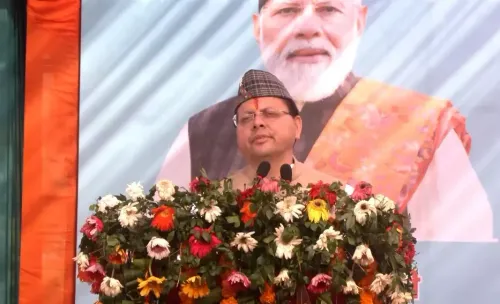How Are MSMEs Defying the Overall Trend in Credit Growth in India?

Synopsis
Key Takeaways
- MSME credit growth shows resilience against overall trends.
- Serious delinquencies drop to a five-year low of 1.8 percent.
- Government initiatives enhance guarantee coverage for MSMEs.
- 2.72 crore registrations completed via the Udyam Assist Platform.
- Indian corporates' cash and bank balances surged by 18-19 percent.
New Delhi, July 19 (NationPress) The Indian credit landscape is undergoing significant transformations, as highlighted in a recent SBI report. While overall bank credit growth has fluctuated, the credit extended to micro, small, and medium enterprises (MSMEs) has demonstrated resilience against this trend.
A substantial influx of credit to current borrowers has been noted, with the MSME sector experiencing a remarkable decline in serious delinquencies—specifically, those classified as 90 to 120 days past due (DPD), which have reached a five-year low of 1.8 percent.
This positive shift, especially among borrowers with financing between Rs 50 lakh and Rs 50 crore, represents a decrease of 35 basis points compared to the previous year, according to Dr. Soumya Kanti Ghosh, Group Chief Economic Advisor at the State Bank of India.
Moreover, the definition of MSMEs has been amended; for instance, the turnover threshold for medium enterprises has been raised to Rs 500 crore. This adjustment could potentially further amplify MSME credit growth, Ghosh noted in the report.
The formalization of MSMEs through URN seeding is significantly boosting MSME credit. The Udyam Registration Number (URN) serves as a permanent ID for businesses seeking registration under the MSME definition and eligibility for guarantee coverage.
As of June 27, a total of 2.72 crore registrations have been processed via the Udyam Assist Platform.
“The government has implemented major initiatives to enhance guarantee coverage for various MSME borrowers—raising the CGTMSE coverage from Rs 5 crore to Rs 10 crore, introducing the Mutual Credit Guarantee Scheme for the MSME manufacturing sector (for loans up to Rs 100 crore), and increasing the Credit Guarantee cover for Startups from Rs 10 crore to Rs 20 crore. These measures are crucial for stimulating MSME credit growth,” Ghosh emphasized.
Indian corporations have considerably reduced their debt levels while increasing cash reserves. In the past two years (FY24 and FY25), cash and bank balances among Indian firms surged by approximately 18-19 percent. Key sectors such as IT, Automobiles, Refineries, Power, and Pharma have reported greater cash holdings. The cash and bank balance of Indian firms, excluding BFSI, is projected to reach around Rs 13.5 lakh crore in FY25, indicating sufficient cash flow to support expansion initiatives, according to the SBI report.









